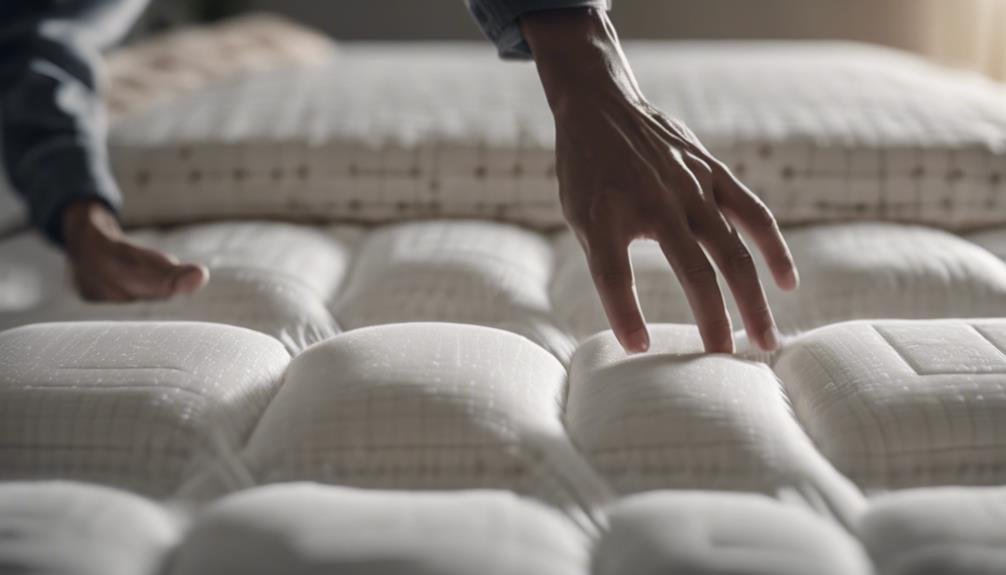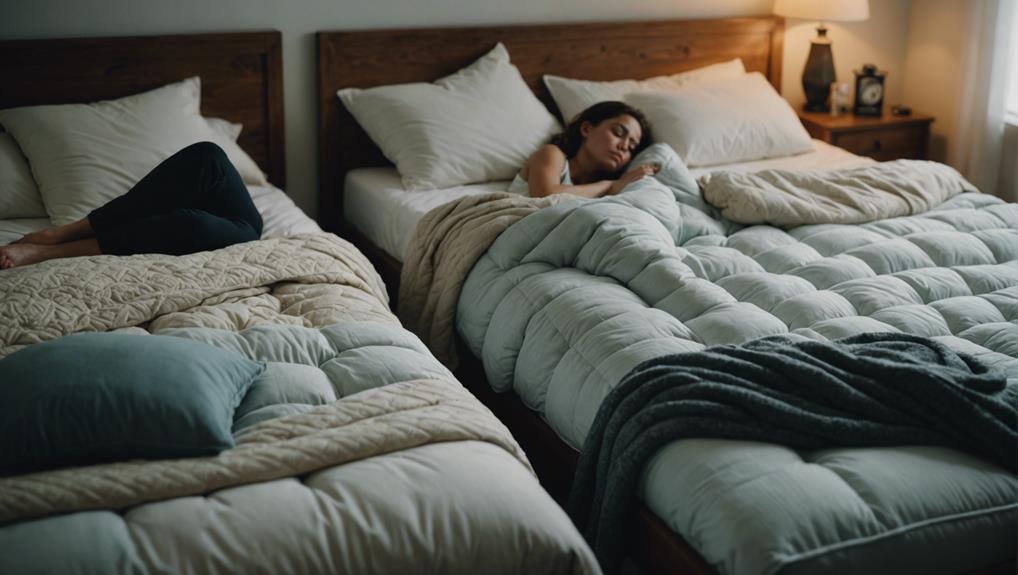When you're selecting a mattress, the firmness level can greatly impact your sleep quality. To make an informed decision, you need to take into account several factors, starting with your body weight and sleep position. Each of these elements plays a role in determining the level of support and comfort you'll need. Don't overlook any specific health conditions that might influence your choice. By exploring these aspects, you can narrow down your options and move closer to finding the ideal mattress. Curious about how personal preferences and mattress responsiveness fit into the equation? Let's delve deeper.
Key Takeaways
- Evaluate your body weight to ensure the mattress provides adequate support.
- Identify your sleep position for optimal pressure relief and spinal alignment.
- Consider personal preference based on your sleeping habits and comfort needs.
- Test various firmness levels in-store to find the most suitable option.
- Choose a mattress that promotes proper spinal alignment to improve sleep quality.
Assess Your Body Weight
Understanding your body weight is vital when choosing the right mattress firmness. Your weight directly impacts how a mattress feels and supports you throughout the night.
Lighter individuals often prefer softer mattresses because they provide better comfort and prevent excessive sinkage, ensuring proper support. On the other hand, if you weigh over 230 pounds, you might find firmer mattresses more suitable. Firmer mattresses offer robust support and maintain proper spinal alignment, which is essential for avoiding back pain and achieving restful sleep.
Selecting the right firmness based on your body weight ensures you don't experience discomfort or inadequate support. For lighter individuals, sleeping on a firmer mattress can lead to excessive sinkage, throwing off your spinal alignment and causing discomfort.
Conversely, if you're heavier, softer mattresses mightn't provide the necessary support, leading to sagging and poor sleep quality. Therefore, understanding your body weight and how it interacts with mattress firmness is a key step in finding the perfect mattress.
Identify Your Sleep Position
Knowing your sleep position is just as important as considering your body weight when selecting the right mattress firmness. Side sleepers typically benefit from a medium-soft to medium-firm mattress. This combination provides excellent pressure relief and body contouring, ensuring comfort throughout the night.
If you're a back sleeper, a medium-firm to slightly firm mattress is often ideal. It offers the right balance of support and spinal alignment, preventing back pain and other discomforts.
For stomach sleepers, a medium-firm to firm mattress is generally preferred. This firmness prevents excessive sinking and maintains spinal alignment, offering the necessary support to keep your body in a neutral position.
Combination sleepers, who switch positions throughout the night, should choose a mattress based on their primary sleeping position. This approach guarantees you receive the right balance of comfort and support, regardless of how you move.
Matching your sleep position to the appropriate mattress firmness is crucial for a good night's sleep and overall well-being. Whether you're a side, back, stomach, or combination sleeper, the right mattress will support your body's natural alignment and provide the comfort you need for restful sleep.
Evaluate Personal Preferences

Evaluating your personal preferences is essential for selecting a mattress firmness that guarantees a restful and comfortable night's sleep.
Start by considering your preferred sleeping position. If you're a side sleeper, you'll likely need a softer mattress to cushion your pressure points. Back sleepers generally benefit from a medium-firm mattress that offers balanced support, while stomach sleepers often require a firmer surface to prevent their hips from sinking too deeply.
Next, gauge your body weight. Heavier individuals usually need a firmer mattress to provide adequate support and prevent sagging, while lighter individuals might prefer a softer mattress for enhanced comfort.
If you suffer from back pain or have specific pressure points, selecting a mattress that aligns with these needs can be pivotal in alleviating discomfort and promoting restful sleep.
Don't forget to test out different firmness levels. Many brands offer generous trial periods, allowing you to experience various options before making a commitment. This hands-on approach helps ensure you find a mattress that meets your comfort and support needs.
Ultimately, understanding your personal preferences will guide you to the ideal mattress firmness, enhancing your overall sleep quality.
Understand Firmness Vs. Support
Grasping the difference between firmness and support is essential for choosing a mattress that meets both comfort and alignment needs. Mattress firmness refers to the immediate feel when you lie down. It's that initial impression—whether it's soft, medium, or firm—that affects your overall comfort.
However, support is about how well the mattress maintains your spinal alignment, which directly impacts your sleep quality.
Understanding this distinction is important when selecting a mattress. Soft mattresses can still provide excellent support if they're designed to keep your spine aligned, despite their plush feel. On the other hand, firm mattresses may offer less pressure relief and feel less comfortable but could still ensure proper support depending on their construction.
When choosing a mattress, remember that firmness affects your comfort and pressure relief, while support influences your spinal alignment and overall sleep quality. It's essential to balance these elements to ensure you get the best of both worlds.
Consider Mattress Responsiveness

When selecting a mattress, you should consider its responsiveness, which is how swiftly it adapts to your movements during sleep. Mattress responsiveness is important because it affects how well the mattress adjusts to your movements, providing the necessary pressure relief and support during sleep. If you tend to shift positions frequently, a more responsive mattress can be beneficial.
Latex mattresses and hybrid mattresses are known for their high responsiveness. They adjust to your movements quickly, offering excellent support and pressure relief. Latex mattresses, in particular, are highly responsive and provide a good bounce, making it easier for you to move around without feeling stuck. Hybrid mattresses combine the benefits of both innerspring and foam layers, resulting in a balanced feel that's both supportive and responsive.
On the other hand, memory foam mattresses offer slower responsiveness. They contour to your body shape, providing a more enveloping feel. While this can be excellent for pressure relief, it may lack the bounce and ease of movement that latex and hybrid mattresses offer.
Your preference for bounce and ease of movement should guide your choice in mattress responsiveness, ensuring you get the best sleep experience possible.
Explore Pillow Loft Impact
Understanding the impact of pillow loft is essential for achieving ideal mattress compatibility and overall sleep comfort. Pillow loft, or the height and thickness of a pillow, plays a vital role in how well it complements the firmness of your mattress. Matching the right pillow loft to your mattress firmness can greatly influence your overall comfort and spinal alignment.
High-loft pillows are particularly suited for firm beds. The added height provides the necessary support to keep your head and neck aligned with your spine, which is important for maintaining proper spinal alignment. This combination helps in distributing your body weight evenly, reducing pressure points, and enhancing your overall comfort.
On the other hand, low-loft pillows are ideal for softer mattresses. The lower height offers adequate cushioning without compromising support. When paired with a softer mattress, low-loft pillows help maintain the natural curve of your neck and spine, avoiding any undue strain.
Understanding how pillow loft impacts mattress compatibility can make a significant difference in your sleep quality. By choosing the right pillow loft for your mattress firmness, you can improve your sleep posture, reduce discomfort, and enjoy a more restful night's sleep.
Look Into Adjustable Options

Exploring adjustable mattress options can transform your sleep experience by allowing you to customize firmness levels to suit your individual needs. Adjustable mattresses offer the unique advantage of tailoring your bed's firmness to your personal preferences.
If you share your bed with a partner, dual-firmness options are a game-changer, accommodating different comfort levels for couples. These mattresses typically come with remote controls or manual adjustments, making it easy to fine-tune the firmness.
This feature is particularly beneficial for addressing specific issues like back pain or pressure relief. By adjusting the firmness, you can find the perfect balance that alleviates discomfort and promotes better sleep posture.
Versatility and flexibility are key benefits of adjustable mattresses. They allow you to adapt your bed to different sleeping positions and changing needs over time. Whether you need a firmer surface for more support or a softer setting for extra comfort, an adjustable mattress can provide a personalized sleep experience that evolves with you.
Incorporating an adjustable mattress into your bedroom setup can enhance your sleep quality to a high degree. The ability to customize firmness ensures that your bed meets your exact requirements, leading to more restful and rejuvenating nights.
Frequently Asked Questions
How to Choose the Right Firmness of a Mattress?
When choosing the right mattress firmness, consider your sleeping position first. Back sleepers usually go for medium-firm mattresses.
Next, factor in your body weight—lighter individuals often prefer softer options, while heavier folks need firmer support.
Don't forget to test different firmness levels in a store. Aim for a mattress rated 5-7 on the firmness scale.
Lastly, consult with experts or take a mattress quiz for personalized advice.
What Mattress Firmness Is Best for Side Sleepers?
For side sleepers, a mattress with a firmness level between 3-6 is best.
If you weigh under 130 pounds, aim for a firmness around 5-6 to balance support and comfort.
Soft mattresses prevent pressure points, especially around your shoulders and hips, and improve spinal alignment.
This guarantees you get a restful and comfortable night's sleep.
What Level of Firmness Is Best for Back Pain?
For back pain, you'll want a mattress that's medium-firm, around 6-7 out of 10. This offers a balance of support and cushioning.
If you're a back sleeper, a slightly firmer mattress, like 7-8, can help maintain spinal alignment. Memory foam or latex options are great because they contour to your body.
Avoid very soft mattresses, as they don't provide enough support.
Always consider consulting a healthcare provider for personalized advice.
How to Tell if a Mattress Is Too Soft or Firm?
To tell if a mattress is too soft or firm, check for excessive sinkage and poor spinal alignment. Waking up with back or neck pain suggests the mattress is too soft.
Conversely, if it's too firm, you might feel discomfort, especially when sleeping on your side. Pay attention to how your body feels and any discomfort levels to determine the right support and alignment for you.
What Are the 7 Tips for Selecting the Right Mattress Firmness?
When choosing the perfect mattress, consider these 7 tips for firmness selection. Evaluate your sleeping position, body weight, and any medical conditions. Research different firmness levels and read customer reviews. Test out mattresses in person to find the right balance of support and comfort. Your ideal firmness is crucial for a good night’s sleep.
Conclusion
By considering your body weight, sleep position, and personal preferences, you'll find the right mattress firmness.
Don't forget to understand the difference between firmness and support, and consider mattress responsiveness.
Explore how pillow loft impacts your sleep and keep adjustable options in mind.
Taking these steps guarantees you'll choose a mattress that promotes spinal alignment and comfort, leading to a restful night's sleep.
Make the right choice, and wake up feeling rejuvenated every day.

